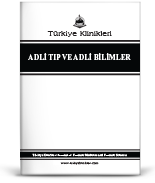Amaç: Bu araştırmanın amacı, farklı evrelerdeki hukuk öğrencileri ve avukatların cezalandırıcı tutumlarının karşılaştırılması, hukuk eğitimi ve pratiğinin cezalandırıcı tutumda rolünün olup olmadığının incelenmesidir. Gereç ve Yöntemler: Araştırma, 2019 yılında İstanbul'da hukuk fakültesi 1. ve 4. sınıf öğrencileri ile en az 5 yıllık mesleki deneyimi bulunan avukatlardan oluşan, toplam 412 katılımcıyı kapsayan bir anket çalışması ile gerçekleştirilmiştir. Verilerin toplanmasında ''sosyodemografik bilgi formu'', ''avukatlara yönelik bilgi formu'' ve ''cezalandırıcı tutum ölçeği'' kullanılmıştır. Anket sonucu elde edilen veriler SPSS (V-18) kullanılarak analiz edilmiş ve değerlendirilmiştir. Bulgular: Araştırmanın bazı önemli sonuçlarına göre cinsiyetin cezalandırıcı tutumda rolü olduğu, 1. sınıf öğrencilerinin, 4. sınıf öğrencilerine oranla daha cezalandırıcı bir tutum sergiledikleri, avukatların tutumlarında yaşın etkili olabileceği, 1. sınıf öğrencilerine oranla daha az cezalandırıcı olmakla birlikte, 4. sınıf öğrencilerine oranla daha cezalandırıcı oldukları ortaya çıkmıştır. Sonuç: İnsan hak ve özgürlüklerine en fazla müdahale edilen ceza hukuku alanında bu müdahalenin, evrensel hukuk normlarına göre oluşturulabilmesi için hukuk eğitiminin önemli ve gerekli olduğu kısmen de olsa ortaya konulmuştur.
Anahtar Kelimeler: Cezalandırıcı tutum; hukuk eğitimi; hukuk pratiği
Objective: The aim of this study is to compare the punitive attitudes of law students at different stages and lawyers, and to examine whether legal education and practice has a role in the punitive attitude. Material and Methods: A survey has been conducted to 412 participants, who are first-year law students, fourthyear law students and working as lawyer with at least five years experience. Data was collected by means of a sociodemographic questionnaire, a profession questionnaire for lawyers, and a punitiveness scale. Gained data has been analyzed statistically by using SPSS (V-18). Results: According to some important results of the research; it has been revealed that gender has a role in punitive attitude, first-year law students have a more punitive attitude compared to fourth-year law students, age can be effective in the attitudes of lawyers, they are less punitive than first-year law students, but more punitive than fourth-year law students. Conclusion: In the field of criminal law, where human rights and freedoms are most interfered, it has been demonstrated that legal education is important and necessary in order to create this intervention in accordance with universal legal norms.
Keywords: Punitive attitude; law education; law practice
- Windzio M, Simonson J, Pfeiffer C, Kleimann M. Kriminalitätswahrnehmung und Punitivität in der Bevölkerung - Welche Rolle spielen die Massenmedien? Ergebnisse der Befragungen zu Kriminalitätswahrnehmung und Strafeinstellungen 2004 und 2006. Forschungsbericht. Hannover: KFN; 2007.[Link]
- Adriaenssen A, Aertsen I. Punitive attitudes: towards an operationalization to measure individual punitivity in a multidimensional way. European Journal of Criminology. 2015;12(1)92-112.[Crossref]
- Kury H, Kania H,Obergfell-Fuchs J. [What do we mean by punishment? Attempt at a conceptual and empirical definition]. Kriminologisches Journal. 2004;36:51-88.[Link]
- Cochran J, Chamlin M. Can information change public opinion? Another test of the Marshall hypothesis. Journal of Criminal Justice. 2005;33(6):573-84.[Crossref]
- Unnever JD, Cullen FT, Roberts JV. Not everyone strongly supports the death penalty: assessingg weakly-held attitudes about capital punishment. American Journal of Criminal Justice. 2005;29(2):187-216.[Crossref]
- Applegate BK, Cullen FT, Fisher BS, VanderVen T. Forgiveness and fundamentalism: reconsidering the relationship between correctional attitudes and religion. Criminology. 2000;38(3):719-53.[Crossref]
- Applegate BK, Cullen FT, Fisher BS. Public views toward crime and correctional policies: is there a gender map? Journal of Criminal Justice. 2002;30(2):89-100.[Crossref]
- Chiricos T, Welch K, Gertz M. Racial typification of crime and support for punitive measures. Criminology. 2004;42(2):358-90.[Crossref]
- Mackey D, Courtright KE. Assessing punitiveness among college students: a comparison of criminal justice majors with othe majors. Criminal Justice Studies. 2000;12(4):423-41.[Crossref]
- Tsoudis O. Does majoring in criminal justice affect perceptions of criminal justice? Journal of Criminal Justice Education. 2000;11(2):225-36.[Crossref]
- Gideon L, Sherman-Oren A. The role of social distress, political affiliation, and education in measuring punitive attitudes: Israel as a case study. International Criminal Justice Review. 2014;24(2):151-71.[Crossref]
- Gault BA, Sabini J. The roles of empathy, anger, and gender in predicting attitudes toward punitive, reparative, and preventative public policies. Cognition and Emotion. 2000;14(4):495-520.[Crossref]
- Cullen FT, Clark GA, Cullen JB, Mathers RA. Attribution, salience, and attitudes toward criminal sanctioning. Criminal Justice and Behaviour. 1985;12(3):305-31.[Crossref]
- Jan IF, Ball JD, Walsh A. Predicting public opinion about juvenile waivers. Criminal Justice Policy Review. 2008;19(3):285-300.[Crossref]
- Costelloe MT, Chiricos T, Buriánek J, Gertz M, Maier-Katkin D. The social correlates of punitiveness toward criminals: a comparison of the Czech Republic and Florida. The Justice System Journal. 2002;23(2):191-220.[Link]
- Eskridge CW. A brief response to "students' views on criminal justice," by Farnworth, Longmire, and West. Journal of Criminal Justice Education. 1999;10(2):291-5.[Crossref]
- Shelley TO, Waid CA, Dobbs RR. The influence of criminal justice major on punitive attitudes. Journal of Criminal Justice Education. 2011;22(4):526-45.[Crossref]
- Kuh GD, Cruce TM, Shoup R, Kinzie J, Gonyea RM. Unmasking the effects of student engagement on first-year college grades and persistence. The Journal of Higher Education. 2008;79(5):540-63.[Crossref]
- Farnworth M, Longmire DR, West VM. College students' views on criminal justice. Journal of Criminal Justice Education. 1998;9(1):39-57.[Crossref]
- Chen G, Einat T. To punish or not to punish - that is the question: attitudes of criminology and criminal justice students in Israel toward punishment. International Journal of Offender Theraphy and Comparative Criminology. 2017;61(3):347-67.[Crossref] [PubMed]
- Karasu R. [Law education in Turkey and Germany - equivalence of diplomas]. Ankara Havı Bayram Veli Üniversitesi Hukuk Fakültesi Dergisi. 2016;20(1):3-26.[Link]
- Uyumaz A, Erdoğan K. [Legal education and law clinic in comparative law and Turkish law]. Ankara Üniversitesi Hukuk Fakültesi Dergisi. 2015;64(2):459-506.[Crossref]
- King A, Maruna S. Once a criminal, always a criminal?: 'redeemability' and the psychology of punitive public attitudes. European Journal on Criminal Policy and Research. 2009;15(1):7-24.[Crossref]







.: Process List